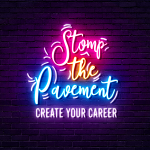People tend to overcomplicate how they organize their resume sections. When I worked in Career Services, it was one of the biggest mistakes I would see: people would have their resumes divided into so many specific sections, and their most related, impressive experiences would end up at the bottom.
There have been studies done that prove employers spend more time reading the top of your resume and the top of each section of your resume- they don’t often take the time to read every part of every section.
Therefore, it’s important your relevant and most notable experiences are at the top of your resume, so you practically guarantee they’ll see them.
Over the years, I’ve picked up some clever tips and tricks to organize every one of your resume sections. With these tips, you’ll have your most important information at the top of your resume, so you can be sure they’ll see it!
You’ll be shocked by how simple it is to effectively organize your resume sections, so let’s dive in!
Education
The education section is one of those nearly universal must haves on a modern resume. If you’re in college, a recent grad, or if your education is more relevant than your experiences, this section should be at the top of your resume.
It’ll provide a perfect little introduction to you and an overview of the formal education you’ve had.
By the way, you don’t want your high school information on here if you’re in or out of college (because you had to have gone to HS to be in college)- yes, even if you graduated HS with high honors or an impressive accolade.
If, however, it’s been a couple years since you graduated and you’ve had some impressive, related experiences since college, then you should start with the section I’ll be talking about next. In that case, you can plop your education section near the bottom of your resume.
Once you’ve got your education section sorted, it’s time to move on to the ONLY 2 resume sections you need to organize your work, volunteer, collegiate, and leadership experiences.
80% OF JOBS ARE ON THE HIDDEN MARKET—
LEARN HOW TO FIND THEM IN THIS FREE WORKSHOP
Are online job apps making your career sour? The key to candy coating your career is networking!
In this FREE workshop, I’ll teach you how to ditch your resume & grow the best resource you have as a job seeker: your network!
Related and Additional
Besides your skills and a couple optional sections, the only other sections you need on your resume are “Related Experience” and “Additional Experience.”
Think about it: if you organize your resume by the typical “Work Experience,” “Volunteer Experience,” etc, and you have a super relevant, interesting volunteer position, while your paid position is completely unrelated, then your more related experience would go at the bottom.
Why should your better experiences be stuck at the bottom just because of the type of work they were? It doesn’t serve you or your experiences any strategic purpose.
Instead, split your resume into these two sections, related and additional experiences, and then your important experiences will always be at the top of your resume. This way, you know they’ll see the experiences that matter most to them, and you’ll seem perfectly fit for the job!
By the way, within these sections, you still want to list your experiences in reverse chronological order (so start with the ones you’re doing now and work backwards).
Once you’ve sorted your experiences into these two sections, your most important ones will be highlighted and stand out to whomever is reading your resume- woo!
Optional
The next section on your resume (unless, of course, it’s more relevant than the others) is an optional section for your awards, research projects, or publications. if you have them. If not, it’s no biggie!
80% OF JOBS ARE ON THE HIDDEN MARKET—
LEARN HOW TO FIND THEM IN THIS FREE WORKSHOP
Are online job apps making your career sour? The key to candy coating your career is networking!
In this FREE workshop, I’ll teach you how to ditch your resume & grow the best resource you have as a job seeker: your network!
In the awards section, you can include any significant, merit-based scholarships from your college, and your research section could have any in-depth projects you had to complete during your coursework.
The key to this section is if you’ve got it, flaunt it! Don’t shy away from bragging about any achievements or large projects you completed- that’s what your resume is for!
Skills
Most likely, the final section of your resume will be your skills section.
In this section, you ONLY want to include tangible skills- like equipment, computer programs, technical research methods, language skills, and so on.
This was another section I’d see a lot of mistakes in- people tend to include soft skills (like teamwork and communication) in their skills section. That’s not what this section is for!
For my complete tips on this and other common resume mistakes, check out The Most Common Resume Mistakes and How to Fix Them
If you still want to include those soft skills you had to eliminate, then I recommend using them to describe your related and additional experiences above.
Once you’ve finished reformatting your skills section, your resume sections should be reorganized and ready to go!
Don’t fall into the trap of overcomplicating your resume- you’ll most likely wind up with your impressive experiences at the often unread bottom of your resume. Instead, make sure you organize your resume sections strategically by including an education section, splitting your experiences under the headings “Related Experience” and “Additional Experience,” and formatting your skills section correctly. Now, your important, relevant experiences should be at the top, and the rest is strategically structured to highlight you and all the amazing things you’ve done.
Ready to stop relying on your resume? Grab my guide on 10 strategies to network with confidence and transform your career!







